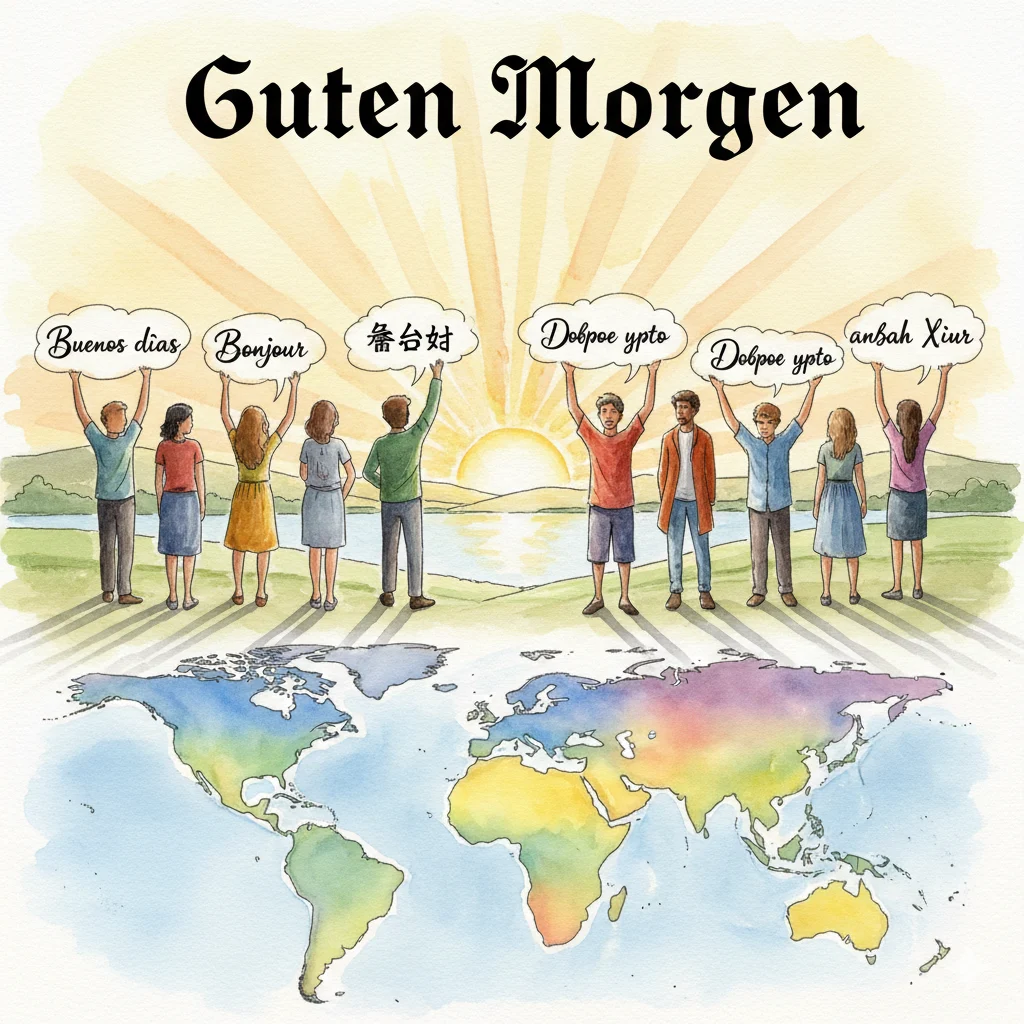Learning how to say “good morning” in German with “Guten Morgen” is a friendly way to start the day, whether greeting a neighbor in Berlin or practicing at home. Imagine brightening someone’s morning with this cheerful phrase, sparking a warm connection.
Mastering German morning phrases opens doors to new friendships, and this greeting varies across languages, reflecting unique cultural traditions. From the lively tones of Spanish to the warm rhythm of Swahili, saying good morning is a universal act of kindness.
Let’s explore how to greet in German and discover global morning greetings, uncovering what they reveal about cultures worldwide. Start learning with Duolingo.
Reference Table: Saying “Good Morning” in Different Languages
| Language | Phrase | Cultural/Linguistic Insight |
|---|---|---|
| German | Guten Morgen | Formal yet friendly, used widely in Germany. |
| French | Bonjour | Means “good day,” versatile for morning use. |
| Spanish | Buenos días | Warm, common in Spain and Latin America. |
| Italian | Buon giorno | Friendly, reflects Italy’s welcoming culture. |
| Mandarin | Zǎo shàng hǎo (早上好) | Polite, emphasizes respect in China. |
| Hindi | Suprabhat | Warm, reflects India’s friendliness. |
| Japanese | Ohayō (おはよう) | Casual, used among friends in Japan. |
| Korean | Annyeonghaseyo (안녕하세요) | Respectful, often used broadly in Korea. |
| Arabic | Sabāḥ al-khayr (صباح الخير) | Means “morning of goodness,” used in 20+ countries. |
| Swahili | Habari za asubuhi | Means “morning news,” warm in East Africa. |
| Zulu | Sawubona ekuseni | Friendly, used in South African mornings. |
| Yoruba | Ẹ kaaro | Warm, common in Nigeria’s social settings. |
| Maori | Ata mārie | Communal, used in New Zealand mornings. |
| Hawaiian | Aloha kakahiaka | Tied to aloha, conveys warmth. |
| Cherokee | Osda sunalei | Emphasizes positivity, Native American roots. |
How to Say “Good Morning” in European Languages
European languages express “good morning” with warmth and clarity. For instance, in German, “Guten Morgen” is polite, used in both formal and casual settings across Germany. Learn more at BBC Languages. In contrast, French uses “Bonjour,” meaning “good day,” versatile for morning greetings in France. Furthermore, Spanish says “Buenos días,” a warm phrase common in Spain and Latin America, reflecting friendliness. Similarly, Italian’s “Buon giorno” is inviting, aligning with Italy’s social culture. These greetings make mornings welcoming across Europe. Want more German phrases? Check our German Greetings Guide. How do you greet in the morning?
Saying “Good Morning” in Asian Languages
Asia’s languages express “good morning” with respect and harmony. For example, Mandarin’s “Zǎo shàng hǎo” is polite, emphasizing respect in China’s structured society. Explore Mandarin at ChinesePod. Meanwhile, Japanese uses “Ohayō,” a casual greeting among friends in Japan. In contrast, Korean’s “Annyeonghaseyo” is respectful, used broadly in mornings. Additionally, Hindi’s “Suprabhat” is warm, reflecting India’s friendliness. Visit HindiPod101 for more. Finally, Arabic’s “Sabāḥ al-khayr,” used in over 20 countries like Egypt, conveys “morning of goodness.” These greetings show Asia’s diverse morning phrases. What’s your favorite Asian greeting?
African Languages: Warm Morning Greetings
African languages say “good morning” with community focus. For instance, Swahili, spoken in Kenya and Tanzania, uses “Habari za asubuhi,” meaning “morning news,” heard in lively markets. Learn Swahili at Transparent Language. Similarly, Zulu’s “Sawubona ekuseni” is warm, reflecting South Africa’s culture. In contrast, Yoruba’s “Ẹ kaaro” is used in Nigeria’s social mornings, emphasizing connection. These phrases, used across over 20 African countries, foster community. Curious about African phrases? See our Basic African Phrases. How do you start your mornings?
Indigenous & Island Languages: Unity in Morning Greetings
Indigenous and island languages express “good morning” with simplicity. For example, Maori in New Zealand uses “Ata mārie,” a communal phrase for morning gatherings. Explore at New Zealand Sign Language Week. Meanwhile, Hawaiian’s “Aloha kakahiaka” conveys warmth, tied to aloha. Similarly, Cherokee’s “Osda sunalei” emphasizes positivity in Native American traditions. In contrast, Samoan’s “Talofa i le taeao” reflects Pacific communal values. These greetings highlight unity. Want more indigenous phrases? Check our Indigenous Language Guide. How do you greet in your community?
Cultural Insights: The Roots of Morning Greetings
Historical Roots
Morning greetings carry cultural history. For instance, in German, “Guten Morgen” traces to Old High German, reflecting a tradition of wishing well. In Arabic, “Sabāḥ al-khayr” stems from historical friendliness in trade markets. These phrases evolved with social norms, uniting people through greetings.
Modern Usage
Today, phrases like Japanese “Ohayō” reflect casual friendliness, while Swahili’s “Habari za asubuhi” ties to storytelling, sharing morning news. As a result, these greetings show how mornings remain vital across cultures. How do morning greetings shape your day?
Proverbs and Sayings: Wisdom of Mornings
- German: “A good morning starts a good day.” Shows positivity’s power.
- Hindi: “Morning brings new light.” Ties greetings to hope.
- Swahili: “Greet the morning, greet the heart.” Emphasizes connection.
- Japanese: “Morning words warm the soul.” Highlights emotional bonds.
- Yoruba: “Morning greetings bring joy.” Links greetings to happiness.
FAQs
Why do some morning greetings sound similar?
Shared roots, like Indo-European languages (German, French), or cultural exchanges, like Arabic’s influence on Swahili, create similarities.
What’s the oldest morning greeting?
Germanic phrases like “Guten Morgen,” from Old High German (8th century), are among the earliest recorded.
How do cultures shape morning greetings?
Collectivist cultures (e.g., African) emphasize community, while individualistic cultures (e.g., European) focus on personal warmth.
Conclusion
From “Guten Morgen” in German to “Habari za asubuhi” in Swahili, learning how to say good morning in German weaves a global thread of kindness. Each greeting, whether Japanese’s casual “Ohayō” or Maori’s communal “Ata mārie,” celebrates our shared morning rituals. As a result, these words unite all people. Share how you say “good morning” in your language below, and post this guide on X to spread positivity!






